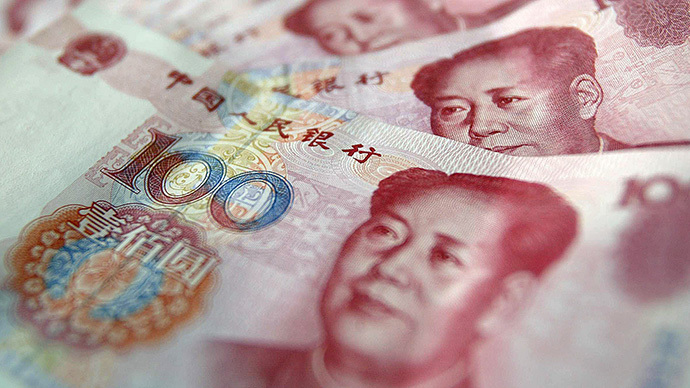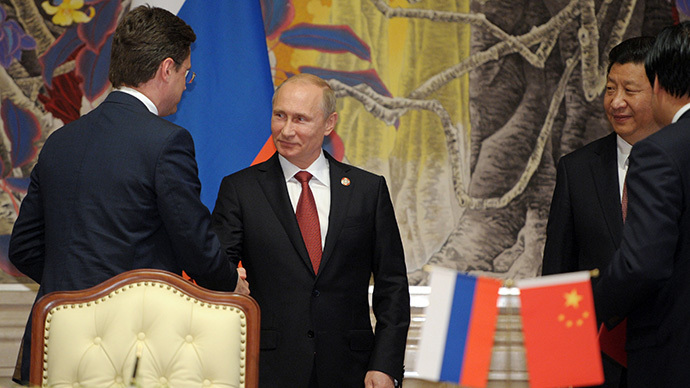‘Chinese yuan as a reserve currency is a long-term story’

Though China has a huge influence on global trade, its position in global stock and bond markets is rather modest in comparison with the US, the President and CEO at SGH Macro Advisors Sassan Ghahramani told RT.
RT:One of Russia's biggest banks has signed an agreement with the Bank of China on the use of national currencies in mutual transactions. There are also reports that the long-term 400 billion dollar gas deal between the two countries could be transacted in roubles and yuan - are we seeing a move away from the US dollar in Russia-China trade?
Sassan Ghahraman: The short answer is yes. This is clearly a very deliberate and a very political attempt to try to move away from the US dollar as an intermediary between Russia and China. It is in addition to the politics of trying to create a zone that is not so dependent on the US. It also fits in with China's broader ambitions to make the Chinese currency, the renminbi, a more broadly convertible currency and to eventually become a reserve currency. It is significant, although it is significant at this point more on a political level and on a very long-term level, I do not really think it will have a short-term impact on the value of the US dollar or its status.
RT:What is behind the trend?
SG: I think you have to put it in perspective. It is a question of size. If you look at the size of the foreign exchange market, it is a market that trades four to five trillion dollars every single day, sometimes more, sometimes less. If we are talking about transactions, it is a very big and important deal, but it is a transaction of $400 billion over 30 years. It is large size, but it is not something that will have any kind of a significant material impact on the value or the flow of the US dollar, except as a symbol of a trend, the intent in the long run for what China wants to do with its own currency. I think Russia's ambitions with the rouble are much more modest than China's ambitions with its own currency. Trade is one component of the use of the currency. When it comes to currency, China has a very large impact because it is such a large global trade partner. But the much bigger component when it comes to demand for the currency is in the capital markets. And when it comes to the capital markets, China's equity markets have grown very big, they are about $3.7-3.8 trillion in value, but the US's is $18 trillion value in the global stock market. And the bond market is much more than that; the US bond market is 20-25% of the global bond market. So we have to keep the perspective of what it actually means now, and what the impact of it is going to be in the near term.

RT:Some experts say closer ties between Russia and China could damage the US economy and the dominance of the dollar - how serious is this threat?
SG: If you look at the history of reserve currencies, and people look much at the UK, and the British pound, the use of the currency as a reserve currency is very much tied to the politics and the power of the country on a geopolitical basis. The pound sterling was the predominant currency through the 1800s when the UK was a predominant not only financial, but also a military power ruling the seas and the trade lines. After WWI there was a real shift, when that mental was shifted from the UK because of the debts that were incurred by the UK during the war, but there was also a political and military passing of the leadership. These things go hand in hand, when people look at the reserve currency, they look at the economic power, the size of the market, but also look at the strength, military and political dominance in the global history and politics. The politics of what is going on with the US around the world and the jostling for power in the Pacific between China and the US, and between Russia and Ukraine to a lesser degree, is very significant, but it is a long-term story.
RT:Do you think that putting an end to the dollar's dominance could bring benefits to the world economy?
SG: The Asia-Pacific struggle is not just between China and the US, but also between China and its neighbors. The neighbors of China - Japan, Philippines, Vietnam, are really trying to balance, and more so Vietnam and the Philippines, Japan is more closely oriented towards the US, are trying to balance a world where they live with China and have to deal with China's military in the South China sea and East China seas and various islands, and deal with it on trade basis, but they are also afraid of it. So they turn to the US as a counterbalance. There is a willingness to open up to China, and there is need for the smaller countries around China (and China has overtaken Japan as the main economic power in the region, though Japan is fighting to come back) to deal with this power. But I do not think they are completely comfortable about that. I am not sure if there is a tremendous enthusiasm at this point from the various countries to cut their links with the US, and you can see it in the military sphere as well, when they are asking for the US support when it comes to some of these disputes with China.
The statements, views and opinions expressed in this column are solely those of the author and do not necessarily represent those of RT.
The statements, views and opinions expressed in this column are solely those of the author and do not necessarily represent those of RT.












